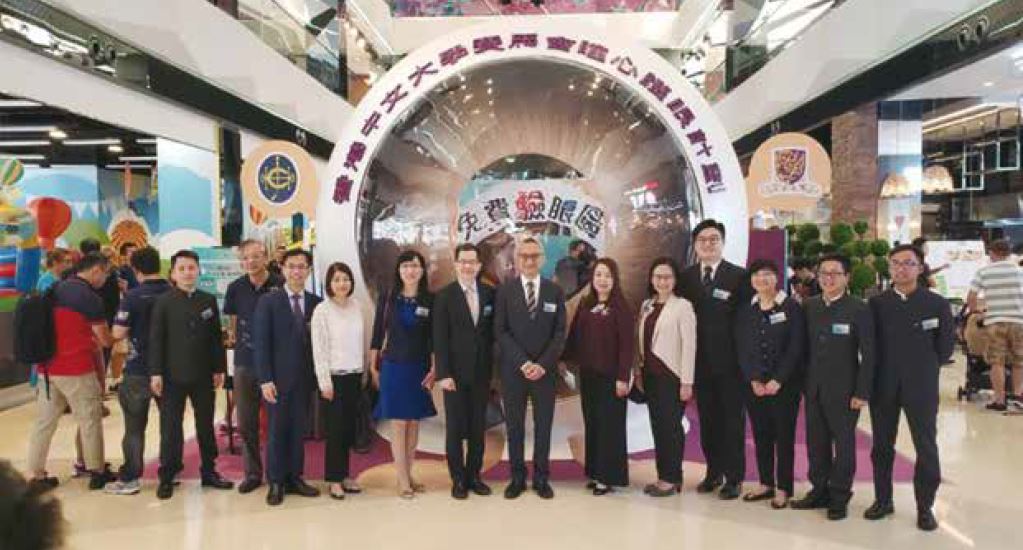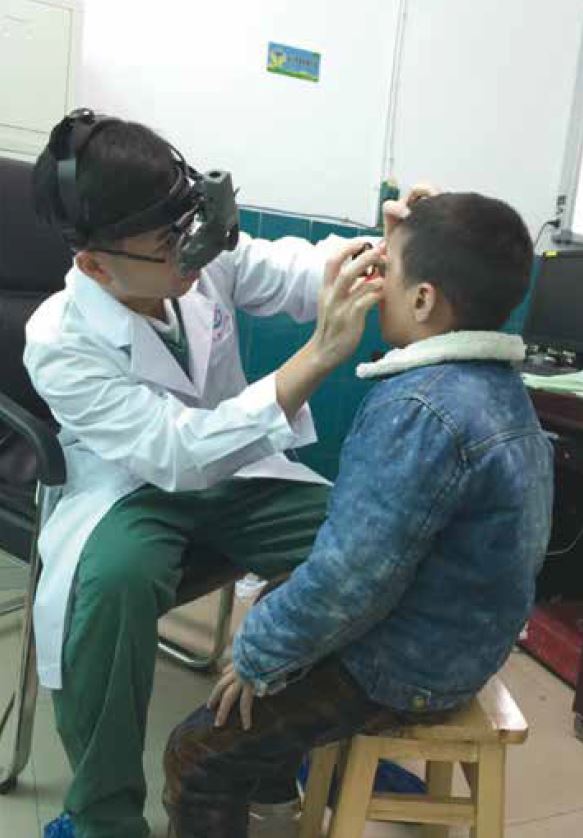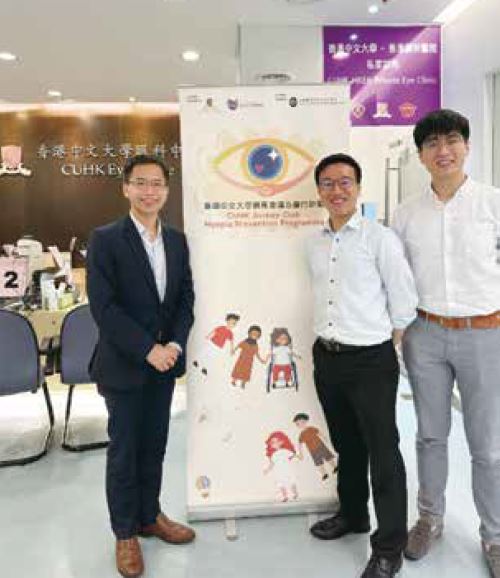© Hong Kong Academy of Medicine. CC BY-NC-ND 4.0
HEALTHCARE FOR SOCIETY
To see is to have a future: an interview with Dr Jason Cheuk-sing Yam
Gordon Chin1; Justin Leung2; William Xue3
1 Year 5, The Chinese University of Hong Kong, Hong Kong SAR, China
2 Year 6, The Chinese University of Hong Kong, Hong Kong SAR, China
3 MB, ChB, The Chinese University of Hong Kong, Hong Kong SAR, China
In 2015, Dr Jason Cheuk-sing Yam launched the Hong Kong Children Eye Care Programme. Currently in
its third phase, and now known as CUHK Jockey
Club Myopia Prevention Programme, it has served
tens of thousands of disadvantaged children since its
inception. For this remarkable initiative, he received
the Ten Outstanding Young Persons Award in 2019
and the Hong Kong Humanity Award in 2021.
After training in Tung Wah Eastern Hospital,
Dr Yam joined the Department of Ophthalmology and
Visual Sciences at The Chinese University of Hong
Kong (CUHK) in 2013 to pursue his interests in
research and education. As an associate professor, Dr
Yam led the team who conducted the 2019 LAMP-1
study and 2023 LAMP-2 Study, which were the
world’s first randomised placebo-controlled trials
of low-dose atropine in children to prevent myopia
progression as well as its onset respectively. He is
also an international leader in ophthalmology, having
served since 2017 as Secretary General of the Asia-Pacific Strabismus and Paediatric Ophthalmology Society.
Determined to act on preventable childhood eye problems, Dr Yam initiated the programme
for underprivileged families, which was the first of
its kind in Hong Kong. “It is a child’s right to see,”
he declared during our interview. Looking back to
when it all started, Dr Yam is truly grateful for the
support he received that allowed him to overcome
various difficulties. “Clinics of the CUHK Eye Centre
in the Hong Kong Eye Hospital weren’t open on the
weekends prior to this programme, while conducting
comprehensive eye examinations in primary schools
was limited by the lack of equipment,” he recalled.
After over a year of preparation, the programme
was finally launched on 7 March 2015, and provided
treatment to over 100 children and their families on
its first weekend at CUHK Eye Centre.
Volunteers from all walks of life play an integral role in the programme—it now relies on the support
of more than 100 ophthalmologists, 500 medical
students, 200 nursing students, 3000 secondary
school students, and 1000 volunteers from various
uniformed services. “I’m deeply grateful to all
ambassador doctors and volunteers who share our
vision and lend us their unconditional support,” Dr Yam said. Today, the programme not only provides
comprehensive eye examinations for children, but
also acts as a platform where volunteers can support
each other while serving the community.
Dr Yam and his team continue to advance their
mission to improve the early detection and treatment of children’s eye conditions. To date, the programme
has provided care to more than 40 000 children,
including both standard assessments, such as testing
for visual acuity and strabismus, and more advanced
diagnostics, using techniques like optical coherence
tomography to detect retinal disorders. Since 2018,
generous support from the Hong Kong Jockey Club
Charities Trust has allowed the programme to
increase in its scope by offering additional services.
Under the programme, participants are eligible for
a subsidy to cover the cost of spectacles if needed.
Outside the hospital, the team has also organised
home visits to reach children with special educational
needs or intellectual disabilities, which has allowed
them to provide basic eye care services and advice
on improving eyesight through environmental
modifications. At the community level, around
400 health talks were given to parents, teachers,
and social workers, and several health exhibitions
were also organised in the hopes of raising public
awareness and knowledge of children’s eye disorders.
In the words of Dr Yam, “Children have unlimited
potential—it is not fair for disadvantaged families’
lives to be affected by visual impairment due to poor
access to healthcare.”
Despite having to sacrifice his weekends to
run the programme, Dr Yam finds the experience
personally rewarding. Over the years, he has
witnessed the growth of his volunteers, watching
secondary school students become medical students
and medical students become ophthalmologists.
During our interview, Dr Yam recounted a heart-warming interaction at a restaurant during a meal
to celebrate his child’s fifth birthday: “A glass of
orange juice was unexpectedly offered to my child,”
he smiled, “I later discovered that it was a gift
from a waiter whose child had benefited from the
programme.” For him, this was a touching reminder
of the positive impact that the programme has had
on the community.
In addition to his local efforts, Dr Yam also
has experience in overseas community service. For
instance, Meigu County in Sichuan Province is one
of several places where Dr Yam and others have
contributed to start the local cataract services, as
high exposure to ultraviolet light here puts residents
at increased risk. This is further compounded by
the challenging terrain and high average age of the
population, many of whom have limited mobility,
which reduces their access to local eye care services.
During his time there, Dr Yam helped to train local
ophthalmologists to ensure the sustainability of the
programme. “One of the most rewarding moments
in ophthalmology is, in fact, performing cataract
surgeries,” Dr Yam said. “You can clearly witness the joy on patients’ faces when they realise they can see
clearly again after removing the gauze.”
Drawing on his faith, Dr Yam has always
believed in the importance of gratefulness and
humility. “Nothing should be taken for granted,”
he said. “I would like to thank our faculty, my
department, and my mentors, Prof Calvin Pang
and Prof Clement Tham, for their encouragement
and guidance. I would like to thank my team, too—in particular, Prof Guy Chen, Dr Ka-wai Kam, Dr
Xiujuan Zhang, and Ms Mandy Ng—as well as all the
partners and volunteers.”
When asked what advice he would give to
young doctors wishing to follow in his footsteps,
Dr Yam reminded us that collaboration is essential
for projects like the programme, remarking that
one needs to be considerate, resilient, and able to
think from the perspectives of others. Teamwork
is essential, as one would not be able to achieve
anything if unable to work well with others. In the
words of Dr Yam, “Follow your heart and passion.
Be true to yourself, and be committed even when
success is uncertain.”

Figure 3. Dr Yam and other guests at the CUHK Jockey Club Children Eye Care Programme (second phase) promotional event



